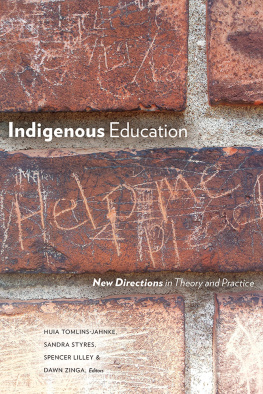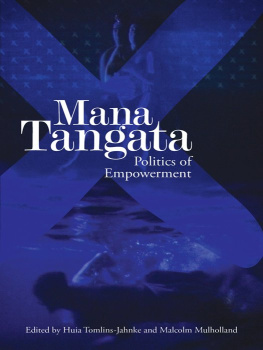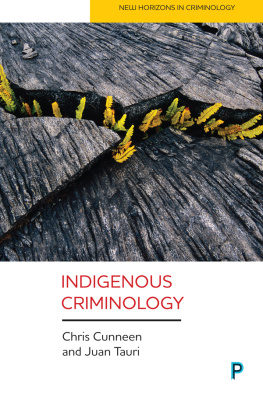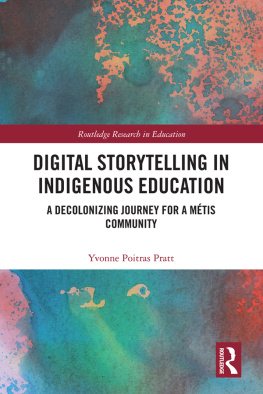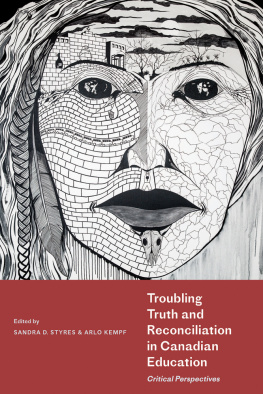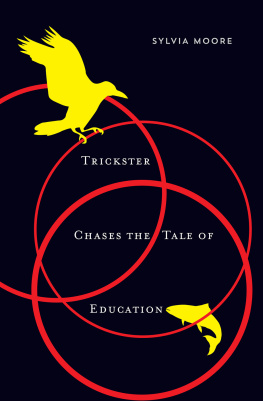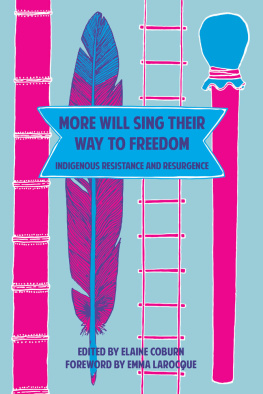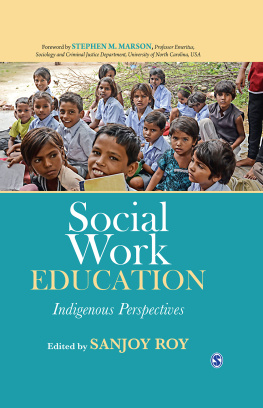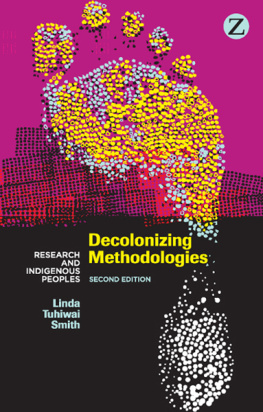Published by
The University of Alberta Press
Ring House 2
Edmonton, Alberta, Canada T6G 2E1
www.uap.ualberta.ca
Copyright 2019 The University of Alberta Press
LIBRARY AND ARCHIVES CANADA CATALOGUING IN PUBLICATION
Title: Indigenous education : new directions in theory and practice / Huia Tomlins-Jahnke, Sandra Styres, Spencer Lilley, and Dawn Zinga, editors.
Names: Tomlins-Jahnke, Huia, editor. | Styres, Sandra D., 1961editor. | Lilley, Spencer, 1963 editor. | Zinga, Dawn, editor.
Description: Includes bibliographical references.
Identifiers: Canadiana (print) 20190094281 | Canadiana (ebook) 20190094338 |
ISBN 9781772124149 (softcover) | ISBN 9781772124453 (EPUB) | ISBN 9781772124477 (PDF) | ISBN 9781772124460 (Kindle)
Subjects: LCSH: Indigenous peoplesEducationNorth America. | LCSH: Indigenous peoplesEducation Islands of the Pacific. | LCSH: Culturally relevant pedagogy.
Classification: LCC LC1099.515.C85 I53 2019 | DDC 370.117dc23
First edition, rst printing, 2019.
First electronic edition, 2019.
Digital conversion by Transforma Pvt. Ltd.
Copyediting and proofreading by The Editing Company, Toronto.
Cover design by Alan Brownoff.
Cover photo: Huia Tomlins-Jahnke. A gifted message from the past to us today. Exterior brickwork on the Mohawk Institute, a former residential school in Brantford, Ontario, Canada
All rights reserved. No part of this publication may be reproduced, stored in a retrieval system, or transmitted in any form or by any means (electronic, mechanical, photocopying, recording, or otherwise) without prior written consent. Contact University of Alberta Press for further details.
University of Alberta Press supports copyright. Copyright fuels creativity, encourages diverse voices, promotes free speech, and creates a vibrant culture. Thank you for buying an authorized edition of this book and for complying with the copyright laws by not reproducing, scanning, or distributing any part of it in any form without permission. You are supporting writers and allowing University of Alberta Press to continue to publish books for every reader.
University of Alberta Press gratefully acknowledges the support received for its publishing program from the Government of Canada, the Canada Council for the Arts, and the Government of Alberta through the Alberta Media Fund.

Contents
LINDA TUHIWAI SMITH
SANDRA STYRES, DAWN ZINGA, SPENCER LILLEY, & HUIA TOMLINS-JAHNKE
MARGARET J. MAAKA
SANDRA STYRES
LEONIE PIHAMA
HUIA TOMLINS-JAHNKE
DWAYNE DONALD
WALLY PENETITO
K. LAIANA WONG & SAM L. NOEAU WARNER
KATRINA-ANN R. KAPANAOKALOKEOLA NKOA OLIVEIRA
SPENCER LILLEY
MICHELLE PIDGEON
FRANK DEER
MARGIE HOHEPA & NGAREWA HAWERA
DAWN ZINGA
JEAN-PAUL RESTOULE & ANGELA NARDOZI
MARI ROPATA-TE HEI
JILL BEVAN-BROWN
WIREMU DOHERTY
ROBERT JAHNKE
DANIEL LIPE
PATRICIA MARINGI G. JOHNSTON
SPENCER LILLEY, HUIA TOMLINS-JAHNKE, SANDRA STYRES, & DAWN ZINGA
Expanding the Indigenous Education Agenda
A Foreword
LINDA TUHIWAI SMITH
THERE IS SOMETHING IMPORTANT to be gained in reading works by Indigenous educators from different contexts, writing about aspects of Indigenous education all together in one book. A whole book on Indigenous education: that is both an accomplishment and a testimony to the scholarship that has emerged about Indigenous education and the diverse topics now being addressed by Indigenous scholars. I recall those texts where Native or Indigenous education referred either to the traditional practices as observed by non-Native scholars or to the deficits and failings of Native communities. I also remember those texts where there was one chapter on Indigenous education buried in among other chapters. It is a pleasure to read a book all about aspects of Indigenous education that are told from different perspectives by Indigenous authors.
There is an interesting discussion to be had about the positioning of different Indigenous experiences alongside each other. At one level all the chapters resonate an idea about Indigenous education while at the same time casting more light on how particular aspects of Indigenous education are understood against a different historical, cultural, and social context. The places people write from add something deeply authentic to the stories they tell. I know that I gain new insights about my context when I read what others have said about their context and their experiences. Is it serendipitous that scholars write about matters that are shared by other Indigenous Peoples across different jurisdictions, or do we indeed have a shared experience and a shared struggle in Indigenous education?
The four sections of this book capture the work being done in theory, knowledge, practice, and the future, while also capturing the growing Indigenous expertise and leadership being gained in specific areas of education, from special education to teacher education, from curriculum to higher education. These and other topics addressed in the book are specializations and subject fields within the broader study of education. The book provides a multidisciplinary set of perspectives across different arenas of Indigenous education, and that makes the book interesting but also relevant to students of education and especially useful to Indigenous educators who are practitioners, researchers, and policy makers.
The book demonstrates the expanded nature of our Indigenous interest in education and our expertise in many aspects of education. The kind of issues being raised demonstrate a deeper knowledge and reflection about our own initiatives. The best example of this is in the field of language revitalization where we have expertise and authority over what we know about the revitalization of Indigenous languages. Some issues raised here would not be seen as a concern for outsiders, perhaps, that intersection of language, culture, and identity within the nation state. What we know is intimate, is experienced, and is researched. We know something about pedagogy, about initial teacher education, about curriculum, about identity and meanings, and about the implications of our own success in some areas.
Clearly, the chapters address the continuing challenge for Indigenous knowledges, values, languages, and peoples to be included in public education systems. What strikes me, however, is how expert we have become at recognizing, naming, and then calling to account the specific barriers we encounter. Some of these barriers, like denialism, dominant language cultures, and institutional accreditation practices, work at different levels or layers and are often unseen; they are the less obvious barriers that continue to challenge Indigenous educational ideas and practices. The examples within the book of positive initiatives, of strong Indigenous analysis, and of the message of hopefulness and determination tell us that education is worth our collective efforts.
Opening
Contested Spaces and Expanding the Indigenous Education Agenda
SANDRA STYRES, DAWN ZINGA, SPENCER LILLEY, & HUIA TOMLINS-JAHNKE
WE WOULD LIKE TO BEGIN our journey by acknowledging not only the complex histories of those on whose traditional lands we collaboratively worked as an editorial team to bring this text together but also the lands of each of the contributing authors. We acknowledge our Elders past and present as well as the ancestors who have shared teachings that guided each of us through the creation of this book. While as authors we may be geographically, culturally, and linguistically distinct, we all wrote on the ancestral lands of our own people or of other Indigenous Peoples (not our own), were conscious of land and its stories, and were thankful that conversations about the book occurred in Aotearoa, Hawaii, and Turtle Island. If you are on anothers land as you read this volume, we ask that you be mindful of and acknowledge the lands on which you are located.
Next page
